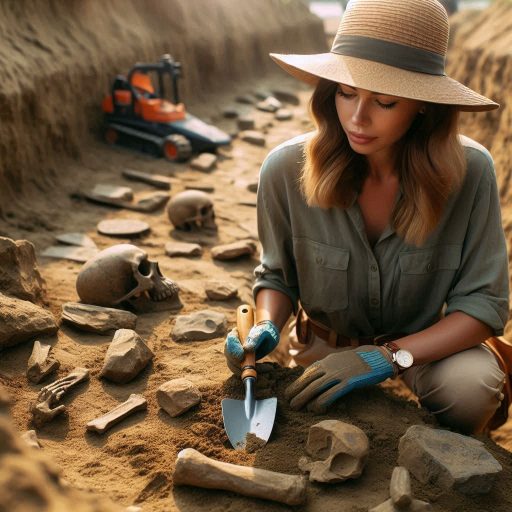Introduction
Funding and grants for anthropology research play a vital role in advancing knowledge and understanding within the field.
Anthropology, which encompasses the study of human societies, cultures, and their development, often requires significant financial resources to support various research activities.
These activities can include fieldwork, data collection, and analysis, all of which are crucial for generating meaningful insights.
Securing funding is essential for researchers to conduct thorough and impactful studies.
Without adequate financial support, many projects may remain unstarted or incomplete, limiting the potential contributions to both academia and society.
Funding allows anthropologists to travel to diverse locations, engage with communities, and conduct in-depth investigations that might otherwise be impossible.
Various sources of funding are available to anthropology researchers, including government grants, private foundations, academic institutions, and non-profit organizations.
Each source offers unique opportunities and challenges, making it essential for researchers to explore all options thoroughly.
By understanding the landscape of funding opportunities, anthropologists can better equip themselves to pursue their research goals and make significant contributions to the field.
Types of Funding for Anthropology Research
Anthropology research thrives on diverse funding sources.
Understanding these options helps researchers secure financial support for their projects.
The Various Types of Funding Available
Government Grants
Government grants represent a primary funding source for anthropology research.
Agencies like the National Science Foundation (NSF) and the National Endowment for the Humanities (NEH) provide significant grants.
These grants often target specific research areas, such as cultural anthropology or archaeological studies.
Researchers must meet specific eligibility criteria, which can include academic qualifications and project relevance.
Application processes for government grants can be rigorous.
Applicants usually submit detailed proposals outlining their research plans, budgets, and timelines.
Grant applications often require collaboration with academic institutions or non-profit organizations.
Successful proposals may receive substantial funding, but competition is fierce.
Private Foundations
Private foundations also play a crucial role in funding anthropology research.
Organizations such as the Wenner-Gren Foundation and the John D.
and Catherine T.
MacArthur Foundation offer grants for innovative projects.
Foundations often focus on specific themes or geographical areas, providing targeted support.
Researchers can access funding for pilot projects, fieldwork, or community-based initiatives.
Eligibility criteria vary among foundations, making it essential for researchers to review specific requirements.
The application process usually involves a letter of inquiry, followed by a full proposal if invited.
These foundations often prioritize projects that demonstrate social impact and interdisciplinary collaboration.
University Funding
Many universities allocate funds for anthropology research through internal grants and fellowships.
Faculty members and graduate students can access these resources to support their research initiatives.
University funding often has less stringent application processes compared to government grants.
Researchers typically submit a brief proposal outlining their project objectives and budget.
Eligibility criteria may include departmental affiliation and academic standing.
University funding fosters local research collaboration and encourages faculty mentorship of students.
Additionally, these funds can help build research networks within the institution.
Crowdfunding
Crowdfunding has emerged as an alternative funding source for anthropology research.
Platforms like Kickstarter and GoFundMe allow researchers to present their projects to the public.
This approach enables researchers to tap into community support and engage with potential contributors.
The eligibility criteria are less formal, but researchers must effectively communicate their project’s value.
Crowdfunding relies heavily on marketing skills and social media outreach.
While crowdfunding may not provide large sums, it can supplement traditional funding sources and increase project visibility.
Corporate Sponsorship
Some researchers seek corporate sponsorship for their projects.
Companies interested in cultural preservation or social responsibility may provide financial support.
Researchers should align their projects with the company’s values and interests.
Application processes may vary, with negotiations playing a significant role.
Corporate sponsorship can yield valuable resources and partnerships for research initiatives.
The Differences Between These Types of Funding in Terms of Eligibility Criteria and Application Processes
Understanding the various funding sources available can significantly enhance anthropology research.
Each type of funding has unique characteristics, eligibility criteria, and application processes.
Researchers should explore these options to find the best fit for their projects.
Read: What Does a Geologist Do? Career Overview and Insights
Application Process for Grants
Applying for grants for anthropology research requires careful planning and attention to detail.
The process typically involves several steps.
The Steps Involved in Applying for Grants for Anthropology Research
First, researchers must identify suitable funding opportunities.
Many organizations and institutions offer grants for anthropology research.
Conduct thorough research to find those that align with your project.
Once you identify potential grants, read the eligibility criteria and application guidelines.
Ensure your project meets all requirements.
Next, gather all necessary documents and information.
Most applications require a detailed project description, budget, and timeline.
Prepare a curriculum vitae that highlights your qualifications and previous research experience.
Tips on How to Write a Successful Grant Proposal, Including How to Clearly Define the Research Objectives and Methodology
When writing the grant proposal, start with a compelling introduction.
Clearly define your research objectives in straightforward language.
Explain why your research is important and how it contributes to the field of anthropology.
Articulate the significance of your study to potential funders.
Make sure to highlight any innovative aspects of your research.
Next, detail your methodology.
Outline how you will conduct your research step by step.
Include specific techniques you will use for data collection and analysis.
Discuss how your methods align with your research objectives.
Be transparent about any potential challenges and how you will address them.
Provide a clear and realistic budget.
Itemize all expected expenses, including travel, equipment, and materials.
Justify each budget item and explain how it relates to your research objectives.
Funders appreciate well-organized and justifiable budgets.
As you finalize your proposal, pay attention to the writing style.
Use clear and concise language throughout the document.
Avoid jargon and technical terms that may confuse reviewers.
Make sure your proposal is easy to read and understand.
If possible, ask colleagues or mentors to review your draft.
They can provide valuable feedback and suggestions for improvement.
Before submitting, double-check your application.
Ensure you meet all formatting requirements and adhere to word limits.
Submit your application before the deadline.
Late submissions can disqualify your proposal from consideration.
After submitting, prepare for follow-up.
Some funding organizations may request additional information or clarification.
Respond promptly and professionally.
Remember, applying for grants can be competitive.
Be persistent and refine your proposals based on feedback received.
Applying for grants for anthropology research involves several key steps.
Identify suitable funding opportunities, write a clear and compelling proposal, and prepare a detailed budget.
By following these guidelines, you can enhance your chances of securing funding for your research.
Read: Educational Path: Becoming a Geologist in the USA
Eligibility Criteria for Funding
Securing funding for anthropology research can be competitive.
Researchers must meet specific eligibility criteria to qualify for grants.
These criteria vary by funding agency or organization.
Specific Criteria for Qualifying for Funding
Generally, applicants must demonstrate a strong academic background in anthropology or related fields.
Having a Ph.D.or advanced degree significantly enhances a researcher‘s eligibility.
Funding bodies often prioritize researchers with relevant experience.
This experience can include prior research projects, publications, or fieldwork.
Demonstrating a track record of successful research strengthens an application.
It showcases the researcher‘s ability to complete the proposed project effectively.
In addition to academic credentials, researchers must outline their project‘s relevance.
They should articulate how their work contributes to the field of anthropology.
Funders look for innovative and impactful research that addresses current issues.
A well-defined research question or hypothesis is crucial for grant proposals.
Applicants also need to show alignment with the funding agency‘s goals.
Each funding organization has its mission and focus areas.
Understanding these priorities helps researchers tailor their proposals.
This alignment increases the chances of funding approval.
Researchers should highlight how their work complements the funder‘s objectives.
Budget justification is another critical eligibility criterion.
Researchers must provide a detailed budget outlining project costs.
They should explain how each expense supports the research objectives.
A transparent budget shows accountability and planning.
Funders appreciate applicants who manage resources wisely.
Moreover, researchers often need to demonstrate institutional support.
This support can come from universities, research institutions, or nonprofit organizations.
A letter of support from an institution can enhance an application.
It indicates that the institution recognizes the project‘s significance.
Ethical considerations also play a role in eligibility.
Researchers must comply with ethical guidelines in their research design.
This compliance includes obtaining necessary permits and approvals for fieldwork.
Funders seek researchers who prioritize ethical standards in their work.
Importance of Strong Research Background and Relevant Experience
Networking within the academic community can also boost eligibility.
Collaborating with experienced researchers or institutions can enhance proposals.
Joint projects often attract more attention from funding bodies.
They indicate a broader support system for the research.
Finally, researchers should prepare a compelling narrative in their proposals.
This narrative should convey passion and clarity about the research objectives.
A well-articulated proposal engages reviewers and demonstrates the researcher‘s commitment.
Eligibility for anthropology research funding hinges on several criteria.
Researchers must showcase their academic qualifications, relevant experience, and ethical practices.
Aligning with funders‘ goals and presenting a clear budget also matter.
A strong proposal narrative can ultimately secure the necessary funding.
Read: Botany Career Fairs and Networking Events

Funding Opportunities for Graduate Students
Graduate students pursuing anthropology research can access numerous funding opportunities.
These resources support their academic and research endeavors while alleviating financial burdens.
Various scholarships, fellowships, and research grants specifically cater to anthropology students.
The Funding Opportunities Available Specifically for Graduate Students Pursuing Anthropology Research
One notable source of funding is the National Science Foundation (NSF).
The NSF offers Graduate Research Fellowships to outstanding students in various disciplines, including anthropology.
This fellowship provides a stipend for living expenses, tuition support, and access to professional development opportunities.
Another significant funding option is the Social Science Research Council (SSRC).
The SSRC provides fellowships to support research in social sciences, including anthropology.
Their International Dissertation Research Fellowship (IDRF) is particularly beneficial for students conducting research abroad.
This fellowship covers travel expenses, living costs, and research materials.
Additionally, the American Anthropological Association (AAA) offers several funding opportunities.
Their various grants support graduate research in anthropology.
The AAA provides the Graduate Student Research Grant, which funds projects that contribute to the discipline’s knowledge base.
This grant helps cover research costs, travel, and data collection expenses.
Many universities also offer internal funding opportunities for graduate students.
Departments often have specific scholarships or grants for students in anthropology.
These funds can help students cover tuition or research-related expenses.
Interested students should consult their academic advisors or department heads for information about available opportunities.
Scholarships, Fellowships, and Research Grants for Graduate Students in Anthropology
Private organizations and foundations provide additional funding sources.
The Wenner-Gren Foundation, for instance, offers various grants for anthropological research.
Their Dissertation Fieldwork Grant supports doctoral students conducting fieldwork, covering expenses such as travel, materials, and living costs.
Similarly, the Fulbright Program offers research grants for students studying abroad, enabling them to conduct significant fieldwork.
Professional associations related to anthropology also provide funding opportunities.
The Society for Applied Anthropology (SfAA) offers several awards for graduate students pursuing applied anthropology research.
These awards support projects that address real-world issues, benefiting communities and practitioners.
Finally, students should explore crowdfunding options.
Platforms like GoFundMe allow researchers to share their projects and seek support from friends, family, and the public.
Crowdfunding can help graduate students raise funds for specific research needs, such as equipment or travel costs.
Graduate students in anthropology have various funding opportunities available.
Scholarships, fellowships, research grants, and internal university funds can support their research endeavors.
By exploring these options, students can secure financial assistance for their studies and research projects.
This support can significantly enhance their academic experience and contribute to their success in anthropology.
Transform Your Career Today
Unlock a personalized career strategy that drives real results. Get tailored advice and a roadmap designed just for you.
Start NowRead: Preparing for a Botany PhD: Tips and Advice
Budgeting for Research Projects
Guidance on How to Create a Budget for Anthropology Research Projects When Applying for Funding
Creating a comprehensive budget is essential for successful anthropology research projects.
A well-planned budget enhances your funding application and ensures project feasibility.
Start by outlining all anticipated expenses associated with your research.
Include costs for travel, materials, equipment, and personnel.
Each category should be as detailed as possible to provide transparency.
Estimate your costs realistically.
Research similar projects to benchmark expenses.
This will help you avoid underestimating or overestimating costs.
Use quotes from suppliers or previous research budgets to validate your estimates.
This approach not only strengthens your budget but also builds credibility with funding agencies.
Include a contingency fund in your budget.
This fund accounts for unexpected expenses that may arise during your research.
A typical contingency amount ranges from 5% to 15% of your total budget.
This demonstrates foresight and preparedness, qualities that funding organizations appreciate.
Break down your budget into specific categories.
Organize your expenses into sections such as personnel, travel, materials, and indirect costs.
This structure allows reviewers to easily assess your financial needs.
Additionally, ensure your budget aligns with the funding agency’s guidelines.
Different organizations may have specific requirements for budget presentation.
When listing personnel costs, provide clear roles and responsibilities for each team member.
Include salaries or stipends based on the time commitment each person will contribute.
This clarity helps funding agencies understand the human resources required for your project.
Consider indirect costs, often referred to as overhead.
These costs may include administrative support, facilities, and utilities.
Some funding organizations allow a percentage for indirect costs, so be sure to account for them.
This inclusion reflects the true cost of conducting research.
Prepare a narrative to accompany your budget.
This narrative should explain each budget line item and its necessity for your research.
Highlight how each expense directly contributes to achieving your research objectives.
A strong narrative can enhance the overall impression of your proposal.
Revise your budget multiple times before submission.
Review it for accuracy, ensuring every detail aligns with your research goals.
Seek feedback from colleagues or mentors familiar with grant applications.
Their insights can help identify potential weaknesses in your budget.
The Importance of Being Realistic and Thorough in Estimating Costs for Research Expenses
Being realistic and thorough in estimating costs is crucial for your research’s success.
Underestimating costs can lead to funding shortfalls, jeopardizing project completion.
Conversely, overestimating may raise red flags for funding organizations.
Striking the right balance demonstrates financial acumen and professionalism.
To be realistic, consider all potential expenses.
Research often involves unexpected challenges, making thorough budgeting essential.
Build flexibility into your budget to accommodate these unforeseen circumstances.
This adaptability signals to funders that you are prepared for the unexpected.
Lastly, remain flexible and ready to adjust your budget as necessary.
Research often evolves, leading to unexpected challenges or opportunities.
Being adaptable in your budgeting approach demonstrates your ability to manage resources effectively.
This skill is crucial for any successful researcher seeking funding.
Delve into the Subject: Prominent Soil Science Laboratories in the USA
Reporting and Accountability
The Importance of Reporting Back to Funders on the Progress and Outcomes of Research Projects
Reporting back to funders is a critical aspect of anthropology research projects.
Funders invest their resources with the expectation of seeing tangible results.
Regular updates demonstrate transparency and keep funders informed about your project’s progress.
This communication builds trust between researchers and funders, fostering a positive relationship.
Reports should include clear, concise summaries of your research activities.
Outline the milestones achieved and any challenges faced.
Highlight how you addressed these challenges to keep your project on track.
This not only showcases your problem-solving abilities but also reassures funders that their investment is secure.
Furthermore, reporting outcomes is essential for evaluating the success of the project.
It allows funders to assess whether their investment met its objectives.
Positive outcomes can lead to future funding opportunities, while constructive feedback can improve subsequent projects.
Demonstrating the impact of your research can encourage continued support from the funding organization.
Consider creating a timeline for reporting throughout your project.
Set specific milestones to update funders regularly.
These updates can be in the form of progress reports, presentations, or formal meetings.
Consistent communication will help you maintain a strong relationship with your funders
The Accountability Measures That Researchers Must Adhere to When Using Funding for Anthropology Research
Accountability is paramount when using funding for anthropology research.
Researchers must adhere to ethical standards and funding agreements.
This includes using funds as outlined in the approved budget.
Deviations from the budget without prior approval can lead to serious consequences, including loss of funding or reputational damage.
Implementing strong financial management practices is crucial.
Keep detailed records of all expenses related to your project.
Regularly reconcile these expenses against your budget to ensure alignment.
This diligence helps identify any discrepancies early on, allowing for timely adjustments.
Moreover, researchers should maintain transparency about their research methodologies and findings.
This openness fosters trust and credibility within the academic community and with funders.
When sharing results, provide both successes and setbacks.
This balanced approach demonstrates integrity and a commitment to the research process.
Ethical considerations also play a significant role in accountability.
Ensure that your research complies with institutional review boards and ethical guidelines.
This includes obtaining informed consent from participants and safeguarding their confidentiality.
Upholding these standards protects the integrity of your research and reinforces funders‘ confidence in your work.
Develop a plan for the long-term sustainability of your research outcomes.
Share strategies for how you intend to continue the impact of your research after funding ends.
This forward-thinking approach demonstrates your commitment to the field and enhances your reputation as a responsible researcher.
Discover More: How to Stay Updated on Toxicology Research
Collaboration and Partnerships
The Benefits of Collaborating with Other Researchers and Organizations to Access Additional Funding Opportunities
Collaboration is vital in the field of anthropology, especially when seeking funding opportunities.
Working with other researchers or organizations can significantly enhance your chances of securing grants.
Collaborative projects often attract more funding due to their broader impact and combined expertise.
Funders typically favor proposals that demonstrate a multidisciplinary approach, as they tend to yield more comprehensive results.
By pooling resources, collaborating researchers can share costs associated with the project.
This can include expenses for fieldwork, equipment, and personnel.
When expenses are shared, it allows for a more extensive exploration of research questions.
This shared investment can make a project more appealing to funding agencies.
Moreover, partnerships can open doors to new funding sources.
Many grants require collaboration between multiple institutions or disciplines.
By forming alliances, researchers can tap into a wider array of funding opportunities.
Collaborative applications often present a stronger case, showing a united front with diverse expertise and perspectives.
Networking is another critical advantage of collaboration.
Engaging with other researchers and organizations allows you to build relationships within the field.
These connections can lead to joint funding applications in the future.
Being part of a network can also provide insights into upcoming funding opportunities that you may not have discovered independently.
The Importance of Building Partnerships to Leverage Resources and Expertise in Anthropology Research
Building partnerships is essential for leveraging resources and expertise in anthropology research.
Collaborative relationships enable researchers to access specialized knowledge and skills that may not exist within their own teams.
For instance, partnering with institutions that have strong fieldwork capabilities or advanced analytical technologies can enhance the quality of your research.
These partnerships also facilitate access to unique datasets and research sites.
Collaborating with local organizations or community groups can provide valuable insights and enhance the authenticity of your research.
These partnerships allow researchers to tap into local knowledge and gain deeper context for their studies.
Furthermore, partnerships can enhance the visibility of your research.
Collaborative projects often receive more attention within the academic community and the public.
This increased visibility can lead to further opportunities, including additional funding, invitations to conferences, and publication prospects.
Effective partnerships also encourage knowledge sharing and capacity building.
By working together, researchers can share best practices and innovative methodologies.
This exchange can enhance the skill sets of all involved, ultimately leading to more robust research outcomes.
Collaboration and partnerships are invaluable in anthropology research.
They provide access to additional funding opportunities, leverage resources, and foster the exchange of expertise.
By building strong relationships within the research community, you can enhance the quality and impact of your work, positioning yourself for greater success.
Find Out More: Ecological Impact Studies: The Botanist’s Role
Discover More: How to Become a Professional Anthropologist
Conclusion
In this blog post, we explored various funding sources available for anthropology research.
Grants from government agencies, private foundations, and academic institutions play crucial roles in supporting research initiatives.
Each funding opportunity has specific eligibility criteria and application processes that researchers must navigate carefully.
Tailoring proposals to meet these requirements effectively can enhance the chances of success.
We discussed the importance of networking with other scholars and attending relevant conferences.
Building relationships in the academic community can lead to potential funding collaborations and shared resources.
Many successful researchers emphasize the value of connecting with peers who may have insights into lesser-known funding opportunities.
Furthermore, keeping abreast of funding announcements through dedicated websites and newsletters can be beneficial.
Actively seeking out these opportunities can significantly enhance research projects and expand their scope.
Adequate funding enables researchers to explore critical questions, conduct fieldwork, and analyze data comprehensively.
Additionally, researchers should consider interdisciplinary funding options, as anthropology often intersects with other fields.
Collaborative projects that incorporate diverse perspectives can attract broader support and open new avenues for exploration.
Engaging with funding agencies directly can also provide valuable insights into their priorities and goals.
[E-Books for Sale]
The Big Book of 500 High-Paying Jobs in America: Unlock Your Earning Potential
$19.99 • 500 High-Paying Jobs • 330 pages
Explore 500 high-paying jobs in America and learn how to boost your career, earn more, and achieve success!
See All 500 High-Paying Jobs of this E-Book
1001 Professions Without a Degree: High-Paying American Jobs You Can Start Now
$19.99 • 1001 Professions Without a Degree • 174 pages
Discover 1001 high-paying jobs without a degree! Unlock career tips, skills, and success strategies for just $19.99!




